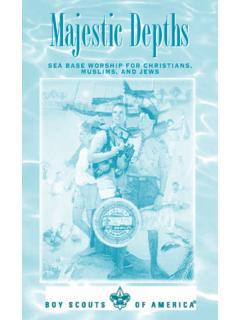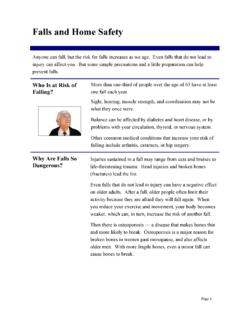Transcription of UNIT FIREGUARD CHART - BSA Troop 29
1 unit FIREGUARD CHARTFill out and post this CHART on your campsite bulletin board. _____ _____ _____ _____ _____TroopTroop fire wardenCampTroop campsiteDatesWe will prevent fires by breaking matches in two after fires COLD OUT with with fingers to test WARNINGCAMPING SAFETY RULESNO TENT MATERIAL IS FIREPROOF, AND IT CAN BURN WHEN EXPOSED TO HEAT OR FIRE. FOL-LOW THESE RULES: Only flashlights and battery-powered lanterns are permitted in tents. NO FLAMES IN TENTS is a rule which must be enforced. Chemical-fueled stoves, heaters, lanterns, lighted candles, matches, or other flame sources should never be used in or near tents. Do not pitch tents near open fire. Do not use flammable chemicals near tents: charcoal lighter, spray cans of paint, or bug killer and repellent. Be careful when using electricity and lighting in tents. Always extinguish cooking and campfires properly.
2 Obey all fire laws, ordinances, and regulations. Keep campers informed on a daily basis of your camp s fire the case of Cub Scouts, they should immediately seek adult help, sound the alarm by yell-ing, Fire! and stay away from attempting to fight any camp fire. If adult help is not readily available, the Cub Scout should continue to sound the alarm, send a runner for help, and/or dial the camp office or all burnable material 4 to 6 feet away from the fires or as required by local TYPES OF FIRE DANGER SIGNS IN CAMPUnit Campsite Fire Prevention AssignmentsFirst Day _____ Patrol_____Fire WardenDateSecond Day _____ Patrol_____Fire WardenDateThird Day _____ Patrol_____Fire WardenDateFourth Day _____ Patrol_____Fire WardenDateFifth Day _____ Patrol_____Fire WardenDateSixth Day _____ Patrol_____Fire WardenDateSeventh Day _____ Patrol_____Fire WardenDateEquipment CheckedEquipment CheckedEquipment CheckedEquipment CheckedEquipment CheckedEquipment CheckedEquipment CheckedSOUND ALARMDROP TENTS (CANVAS ONLY) IF NECESSARY AND SAFE TO DO SOIN CASE OF FIREREPORTING AND ASSEMBLY INSTRUCTIONSAt some camps local changes are made in these suggested pro-cedures.
3 All exceptions, however, should be made on the recom-mendation and with the approval of local fire A unit CAMPSITE1. Sound the alarm by yelling Fire! and then notify the first adult you see, then report to a camp officer or the camp fire Extinguish a fire only if it can be done quickly and When the central alarm is sounded to warn the camp, quickly mobi-lize in your unit . Move to your preassigned point immediately and await A runner reports to the camp office for instructions from the camp fire In the event of a tent fire, you can douse it with water or sand, or sim-ply stand back and let professionals fight the unit CAMPSITE1. If you discover a fire anywhere in camp, report immediately to the camp office so the alarm may be sounded and fire authorities Camp fire warden sounds the central alarm, and your unit follows steps 3 and 4 Remember: Campers should not be directly involved in the fire fighting process except for fires that can be quickly and easily case of a fire in our campsite, we will notify _____ and follow the instructions of our unit fire fire wardenControl of Flammable/Combustible Liquids and Gases in CampBecause serious accidents can happen in connection with the use of liquid fuel, propane, butane, etc.
4 , in lanterns and stoves and as a result of igniting fires with liquid starters, adult supervision is required when chemical fuels are being used for lighting and cooking. Local councils have the option of restrict-ing the use of chem i cal-fueled stoves, lanterns, and heaters in campsites under their jurisdiction. Knowledgeable adult supervision must be provided when Scouts are involved in the storing, handling, and filling of stoves or lanterns or the lighting of chemical fuels. Battery-operated lanterns and flashlights should be used by Scouts in camping activities, particularly in and around all tentage. No chemical-fueled lantern, stove, or heater is to be used inside a tent. Kerosene, gasoline, or liquefied petroleum-fuel lanterns may, when permitted, be used inside permanent buildings or for out door lighting. When used indoors, there must be ade quate ventilation. Strict adherence to the safety standards and the instructions of the manufacturers in fueling and lighting such stoves and lanterns must be carried out under the direct super vision of a responsible and knowledgeable adult.
5 Empty liquid-petroleum cylinders for portable stoves and lanterns should be returned home or to base camp. They can explode when heated; therefore, they must never be put in fire places or with burnable trash. The use of liquid fuels for starting any type of fire is pro hibited. This includes damp wood, charcoal, and cer-emonial campfires. Solid-type starters are just as effective, are easier to store and carry, and are much safer to use for this purpose. Space heaters that use chemical fuels consume oxygen and must be used only in well-ventilated areas. Using space heaters in poorly ventilated cabins, camper trucks, and recre a tion vehicles can cause fires and asphyxiation. The use of char coal burners indoors can be lethal in caus-ing carbon mon oxide Storage and PracticesStorage of liquid fuel and other flammables is a camp main-tenance function. Filling tanks for motors, vehicles, and motor-boats should always be handled by someone qualified by age and training for this responsibility.
6 Similar responsible handling and control are prescribed for the limited use of kerosene. Use kerosene only for outside night lights and stationary heating stoves (not por table). Both gasoline and kerosene should be kept in well-marked safety cans and stored in ventilated locked boxes located away from buildings and tents. Large quantities of gas o line should be stored in a properly installed fuel tank with pump. Keys to pumps and storage boxes or sheds should be given to one adult (primarily the camp ranger), who distributes these fuels. Propane or butane storage tanks and permanent caps should be installed by experienced and knowledgeable individuals and changed only by gas distributors. These instal-lations must conform to local regu la tions and must be inspected Prevention PlanWill your camp be there next season? This is a good ques-tion to ask at the close of each camping season as you pack away equipment and leave.
7 In fairness to next year s camp-ers, do everything that can be done to ensure the safety of camp equipment and camp , with its dry, dead leaves that often bank high around camp buildings is, in many sections of the country, the most dangerous fire season of the entire year. Spring is another bad is a checklist of things to do at all times to be sure that your camp is fireproof year-round:1. Destroy greasy Dispose of all combustible refuse and trash Be sure that doors and shutters are strong enough to keep out trespassers, vandals, or Stow away firewood and loose equipment that might be used by Clear away dead grass or trees, ferns, leaves, bushes, straw piles, and trash from Clean grease traps and dispose of the grease by burning it at a safe place or burying it in mineral Be sure the camp is ready for winter use. Check fuels, wall and floor protection around heaters, and protecting screens for fireplaces.
8 Inspect location of fire pails, fire extin guishers, and mobile fire-fighting Develop a fire prevention plan in accordance with OSHA standard 29 CFR SAFETY CANS ONLY!HOW YOUR unit FIREGUARD PLAN WORKSDUTIESWhen you arrived at camp, you were oriented and trained in the use of the unit FIREGUARD plan. It is your responsibility as a unit leader to train your Scouts in fire prevention, fire detection, report ing, and fire control. Only implement fire control techniques that can be done quickly and the procedures outlined on this CHART and then train your staff and youth members. Post the CHART for all to see and follow. At some camps local changes are made in these suggested procedures. All exceptions, however, should be made on the written recommendation and with the approval of local fire to make the FIREGUARD plan work by appointing capable fire wardens and WARDENS AND DEPUTIESAs responsible Scouts appointed by their adult leader, the unit fire warden and his deputy are in charge of training, know where fire equipment is located, and are familiar with the unit FIREGUARD CHART .
9 They instruct all unit fire wardens and Scouts in the operation of the camp FIREGUARD plan. They con duct annual inspections of fire extinguishers and check to be sure all cooking fires, heat-ing fires, and camp fires are out at night or when no one is attending or monitoring the fire during the day. unit fire wardens and deputies conduct fire drills at least once a week and follow the direction of the camp fire warden. They receive reports related to fire hazards daily from the duty fire boy in the unit should feel responsible for fire prevention, but the unit fire patrol for each day must be alert and ready to evacuate and account for everyone in case of fire emergency or a small fire breaks out, the person discovering it should take immediate action, whether or not he is on the fire patrol for the day. Time is the most important element in the sup-pression of a fire. Some examples of fire control techniques are: Immediately send someone to seek assistance, send a runner for help, and/or dial the camp office or 911.
10 Douse fire with water or sand. Smother fire with a lid. In the event of a tent fire (canvas only), simply kick out the end tent poles if it can be done : Campers should not be involved in the fire fighting process except for fires that can be quickly and easily making daily inspections of the unit campsite, the unit fire warden should follow the fire-preven-tion suggestions and use the fire-fighting equipment illustrations found throughout this CHART as a guide. Campsite equipment will vary according to your camp. Results of the daily inspection should be posted on the CHART in the space FIRE WARDENThe patrol leader is responsible for training his patrol in the unit FIREGUARD plan and leading the unit in practice evacuation and fire checks daily to be sure all members are preventing fires and are prepared in case a fire breaks out. He makes sure and double-checks that fires are built only on nonburnable soil in areas where they will not spread.










